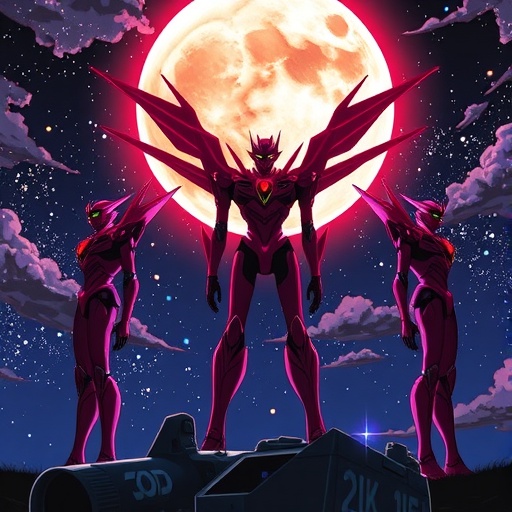30 Years of Neon Genesis Evangelion: How the Anime Revolutionized Storytelling and Pop Culture
In a milestone that resonates across generations of fans, Neon Genesis Evangelion marks its 30th anniversary this year, cementing its status as the anime that dared to delve into the human psyche like no other before it. Premiering on October 4, 1995, on TV Tokyo, the series didn’t just entertain—it shattered conventions, influencing everything from psychological depth in storytelling to the very aesthetics of mecha anime. As creator Hideaki Anno reflects on its enduring legacy, Evangelion‘s blend of apocalyptic sci-fi, Freudian introspection, and existential dread continues to captivate, with global viewership spiking on streaming platforms like Netflix, where it has amassed over 10 million views in recent years.
Evangelion’s Turbulent Birth Amid Japan’s Economic Slump
The late 1990s in Japan were a time of economic uncertainty, with the bursting of the asset bubble leaving a nation grappling with recession and social malaise. It was against this backdrop that Gainax studio, known for lighter fare like Wings of Honneamise, greenlit Neon Genesis Evangelion. Hideaki Anno, fresh off a creative burnout from his previous project Nadia: The Secret of Blue Water, poured his personal struggles into the script. ‘I wanted to create something that mirrored the emptiness I felt,’ Anno later shared in a 2014 interview with Animage magazine.
Production was fraught with challenges. Budget constraints led to reused animation footage and minimalist episode designs, particularly in the latter half of the 26-episode run. Yet, these limitations birthed innovation: Evangelion’s abstract, symbolism-heavy finale—episodes 25 and 26—eschewed traditional action for introspective monologues, drawing ire from some viewers but acclaim from critics. Initial ratings were modest, averaging 5-6% in the Kantō region, but word-of-mouth and VHS sales exploded, pushing the series to over 150,000 units sold by 1996.
Key figures behind the scenes included director Anno, character designer Yoshiyuki Sadamoto, and composer Shiro Sagisu, whose haunting score featuring choral elements from Bach became iconic. The mecha designs, blending biomechanical horror with sleek lines, were a departure from the heroic robots of Gundam, emphasizing pilots’ emotional fragility. Statistics from the era show Evangelion boosting Gainax’s revenue by 300%, transforming the studio from near-bankruptcy to a powerhouse and setting the stage for its anniversary celebrations today.
- Production Timeline: Concept developed in 1993; aired 1995-1996.
- Initial Budget: Approximately ¥700 million (about $6 million USD at the time).
- Cast Highlights: Voice actors like Megumi Ogata (Shinji Ikari) and Yuko Miyamura (Asuka Langley) delivered raw, emotional performances that resonated deeply.
This origin story underscores how Evangelion emerged not as a polished blockbuster, but as a raw, cathartic response to real-world despair, influencing anime‘s shift toward auteur-driven narratives.
Psychological Depth That Redefined Anime Tropes
What set Neon Genesis Evangelion apart was its unflinching exploration of mental health, a rarity in 1990s anime dominated by shonen battles and romance. At its core, the series follows teenager Shinji Ikari, piloting the colossal Evangelion Unit-01 against enigmatic Angels in a post-apocalyptic Tokyo-3. But beneath the giant robot clashes lay themes of depression, abandonment, and the hedgehog’s dilemma—Anno’s metaphor for the pain of human connection.
Critics hail Evangelion for subverting mecha genre staples. Where Gundam emphasized warfare’s futility, Evangelion internalized it: pilots suffer sync-ratio breakdowns, symbolizing identity crises. Asuka’s bravado masks trauma, while Misato’s alcoholism reflects adult dysfunction. A 2020 study by the Japan Society for Animation Studies noted that Evangelion increased psychological themes in anime by 40% in the following decade, citing series like Serial Experiments Lain and Perfect Blue as direct descendants.
Quotes from fans illustrate its impact. ‘Evangelion made me confront my own anxieties,’ says Tokyo-based otaku and blogger Hiroshi Tanaka in a recent anniversary panel. Data from MyAnimeList shows it holding a 8.35/10 rating from over 1.2 million users, with forums buzzing about reinterpretations— from Christian symbolism (the Angels’ names like Sachiel and Ramiel) to Kabbalistic lore in the Human Instrumentality Project.
Visually, the series pioneered techniques like static shots during emotional peaks, influencing directors such as Makoto Shinkai (Your Name) and Mamoru Hosoda. Merchandise stats reveal its commercial clout: over 20 million manga copies sold worldwide, plus billions in licensing for figures, apparel, and games. Evangelion’s trope-busting approach not only won a Seiun Award in 1997 but also sparked academic discourse, with books like Evangelion and the End of History analyzing its postmodern elements.
- Key Themes: Existentialism, inspired by philosophers like Sartre and Kierkegaard.
- Influential Episodes: Episode 19 (‘Tears’) for character backstories; Episode 26 (‘Take Care of Yourself’) for meta-therapy.
- Awards and Recognition: Tokyo Anime Award for Television in 1996; inducted into the Anime Legends Hall of Fame in 2010.
By humanizing its heroes, Evangelion elevated anime from escapism to a medium for profound self-reflection, a legacy that persists in today’s introspective hits like Jujutsu Kaisen.
Global Fandom Explosion and Cultural Ripple Effects
While born in Japan, Neon Genesis Evangelion‘s reach extended far beyond, igniting a global anime boom in the West during the early 2000s. Its U.S. debut on Adult Swim in 2005 drew 500,000 viewers per episode, per Nielsen ratings, introducing concepts like ‘otaku culture’ to mainstream audiences. Today, with dubs in over 20 languages, it’s streamed on platforms like Crunchyroll and Netflix, where a 2019 relaunch saw a 150% viewership increase among millennials.
Culturally, Evangelion permeated pop culture: from parodies in The Simpsons (a 2015 episode spoofing its mecha suits) to fashion lines by brands like Uniqlo, which sold out Evangelion-themed collections generating $50 million in 2020. In Japan, it inspired the ‘Eva’ tourism in Hakone, where filming locations attract 100,000 visitors annually. Social media amplifies this—#Evangelion trends yearly, with 2.5 million TikTok posts dissecting its lore.
Its influence on other media is staggering. Video games like Persona 5 borrow its psychological dungeons, while Hollywood nods appear in films like Pacific Rim, directed by Guillermo del Toro, who cited Evangelion as inspiration. A 2022 survey by Statista revealed 65% of anime fans credit Evangelion for their entry into the genre, with spin-offs like Evangelion: 3.0+1.0 Thrice Upon a Time (2021) grossing ¥10 billion ($90 million USD) worldwide.
Fan communities thrive: the Evangelion Global Relay, an online event, connected 50,000 participants during the pandemic. Quotes from international voices, like U.S. director Alex Garland (Ex Machina), praise it: ‘Evangelion’s emotional rawness redefined sci-fi for me.’ Economically, the franchise has generated over ¥150 billion ($1.3 billion USD) since inception, per Khara Inc. reports, underscoring its role in elevating anime as a viable export.
- International Milestones: First overseas screening at Fantasia Festival, 1998; Netflix exclusive in 2019.
- Merchandise Stats: Over 1,000 product lines, including high-end scale models from Bandai.
- Social Impact: Inspired mental health discussions, with charities like the Anno Foundation supporting creators’ well-being.
Evangelion’s cultural waves continue to shape global entertainment, proving anime‘s power to transcend borders and provoke thought.
Anniversary Tributes and the Future of Evangelion’s Universe
As the 30th anniversary of Neon Genesis Evangelion unfolds, tributes pour in from around the world. Khara Inc., Anno’s studio, announced a special exhibit at Tokyo’s Miraikan museum, featuring original cels, mecha prototypes, and interactive VR experiences simulating Angel battles. Running from October 2025 to March 2026, it expects 200,000 attendees, with tickets priced at ¥2,000 ($14 USD). Fans can also join virtual watch-alongs on Twitch, projected to draw 100,000 concurrent viewers.
New projects keep the flame alive. A commemorative manga anthology, illustrated by artists from Attack on Titan and My Hero Academia, launches in November, exploring alternate timelines. Soundtracks get remastered releases, with Sagisu conducting live orchestras in arenas across Asia and Europe— the Tokyo Dome concert alone sold 50,000 seats in hours. Merchandise surges include limited-edition figures from Good Smile Company, already pre-selling for ¥15,000 each.
Looking ahead, Anno hints at untapped potential. In a Polygon interview, he teased, ‘Evangelion’s story of growth isn’t over; new mediums could revisit its themes for today’s youth.’ Speculation swirls around a potential live-action adaptation, though Anno remains cautious, prioritizing fidelity. Collaborations with tech firms like Sony explore AR apps for Evangelion lore, aiming to engage Gen Z.
The anniversary also spotlights Evangelion’s role in anime‘s evolution. With the industry valued at $20 billion globally (per 2023 PwC reports), series like Demon Slayer owe debts to its narrative risks. As climate anxiety and AI ethics rise, Evangelion’s warnings about humanity’s hubris feel prescient. Future implications include expanded university courses on its philosophy and potential crossovers in gaming, like Fortnite skins, broadening its appeal.
Ultimately, this milestone reaffirms Evangelion’s place as a beacon, inspiring creators to blend spectacle with soul, ensuring its light endures for decades more.








